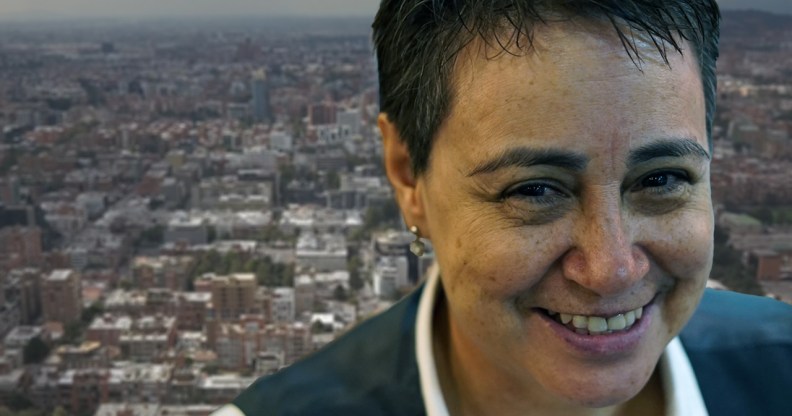Meet the lesbian prisoner who won apology from Colombian government

Colombia’s lesbian hero, Marta Alvarez (Eve Hartley/PinkNews)
Marta Álvarez was subjected to almost a decade of abuse and humiliation because of her sexuality. In a short documentary, she has opened up to PinkNews about her experiences.
The lesbian activist spent nine years in a Colombian prison, for the murder of her brother (who allegedly tried to rape her), and experienced a series of relentless homophobic attacks at the hands of the guards and officials.
Álvarez spent years of her sentence trying to speak out about the inequality and eventually took her case to the Inter-American Commission on Human Rights (IACHR), where she argued she was being discriminated against for not receiving same-sex conjugal visits.
PinkNews went inside the prison party—watch the video below to see what happened:
Little over two decades after her case was first submitted to the commission, she became the first LGBT person to be given a public apology by the Colombian government.
The lesbian prisoner, who was represented by attorney Marta Tamayo of the National Network of Women, by Colombia Diversa and the Center for Justice and International Law (CEJIL), settled upon a list of demands to the government.
One agreement was that a party should be held in one of her former prisons, where she would be given the public apology in front of other LGBT inmates.
Another demand was that a book of her experiences be published and distributed across multiple penitentiaries in the country.
The third demand was that prison officers and officials would participate in LGBT diversity training, in order to understand and learn from Álvarez’s case so it would not happen again.
Marta Álvarez wins her case after homophobic discrimination
At the official public apology in 2017 the-then Colombian Minister of Justice, Enrique Gil Botero, attended and made a speech to officially ask Marta Álvarez for forgiveness on behalf of the state.
“Denying an inmate the right to an intimate visit because of their sexual orientation was a fact of extreme discrimination, but not having offered them an effective judicial recourse to vindicate their rights deepened the institutional violence of which they were victim,” he said.
For Colombia Diversa, the LGBT non-profit working with Marta Álvarez, her case “represents the struggle of women, lesbians and human rights defenders.”
“It reminds us that LGBT people deprived of their liberty have rights and that the Colombian State has the obligation to prevent these people from being discriminated against because of who they are,” they added.
During her time in prison, Álvarez said women were given three months in solitary confinement if they were caught kissing or engaging in what guards deemed as lesbian behaviour.
Speaking to PinkNews, she recounted an incident when a lieutenant threw her against a wall and exposed her breasts to an audience of laughing prison guards. She explained: “He said: ‘I’m going to show you what I’m capable of now.'”
Colombia prisons: What will change?
In 2017, the Colombian state said it would commit itself to implement the necessary measures so that the abuses that Marta Álvarez had to suffer will not happen again.
In December 2018, a year on from the apology, Colombia Diversa told PinkNews: “There has been significant progress in the implementation of these measures of reparation by the state.
“However, more than 60 percent of prisons still have no rules updated and adjusted the General Regulation, so you still do not have adequate measures to ensure the rights of LGBT persons deprived of liberty and to prevent acts of discrimination or violence against this population.”
“[The State] has also not implemented the training program in human rights for prison staff in order to sensitise and train for the dignified treatment of LGBT people deprived of liberty. All this is problematic, since these are measures to ensure that acts of discrimination such as those suffered Marta not repeated,” the spokesperson added.

